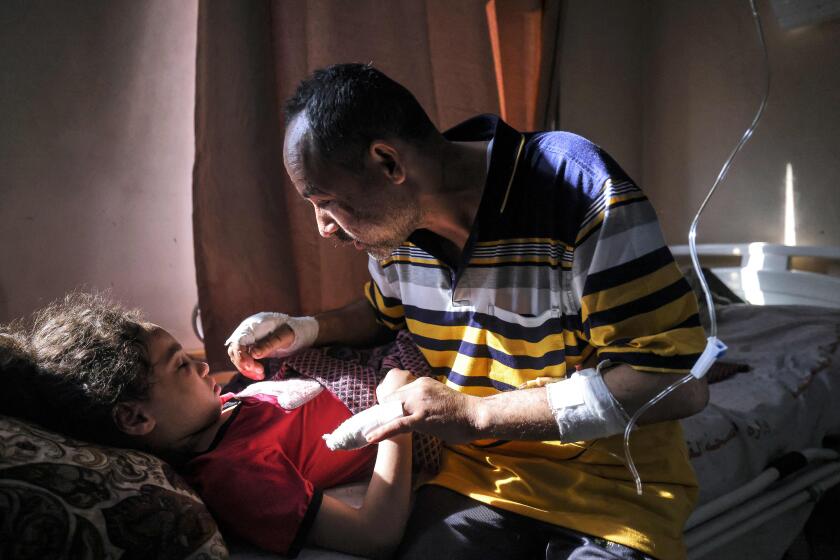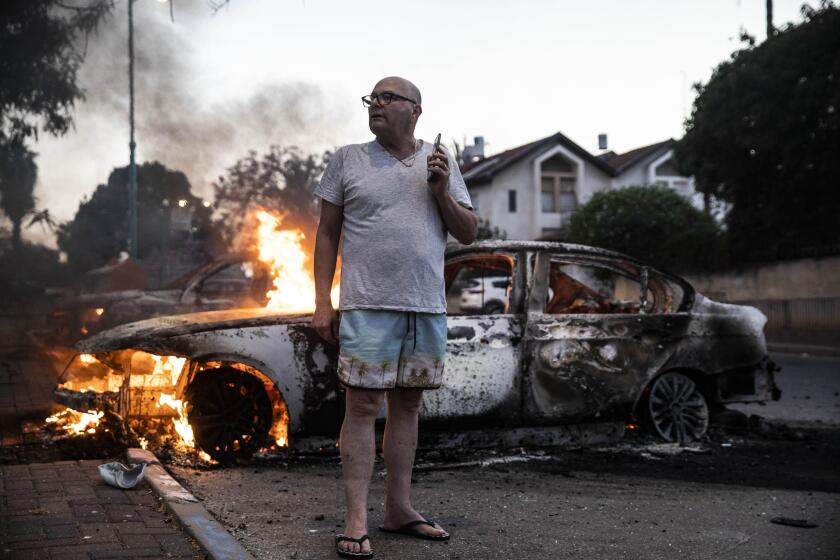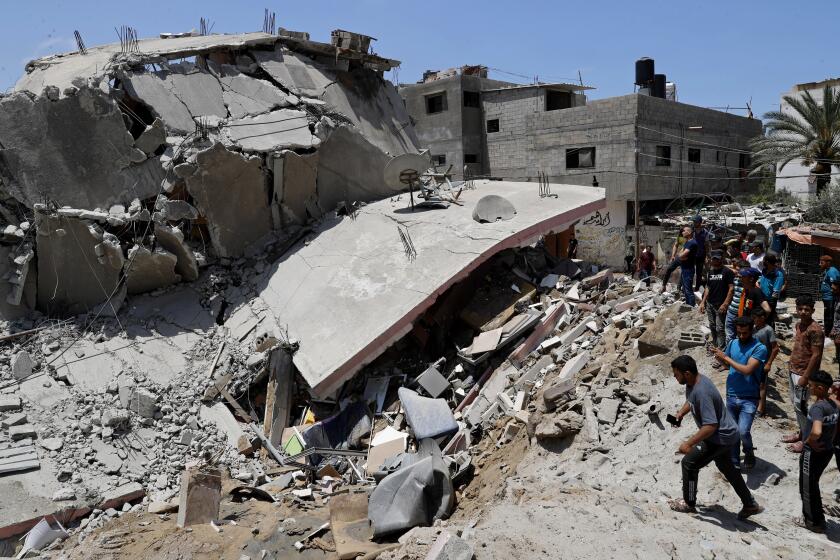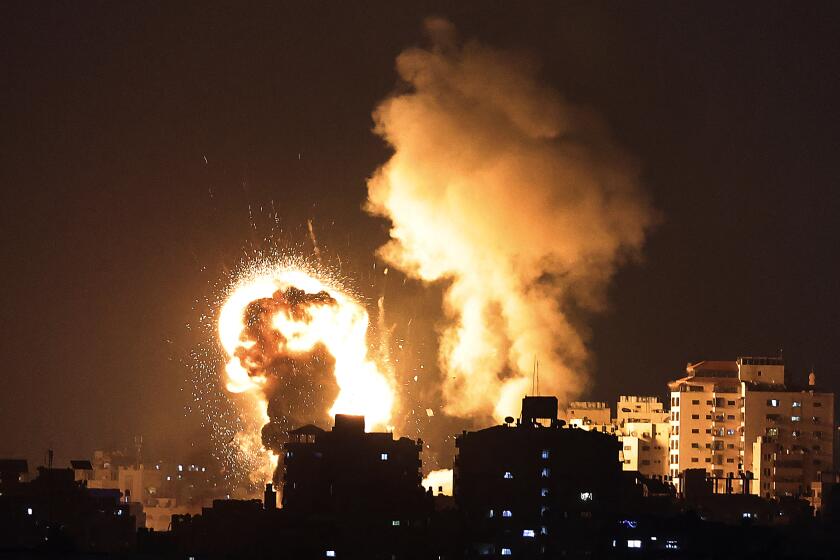Hundreds flee as Israeli airstrikes, tanks pummel Gaza ahead of possible ground incursion
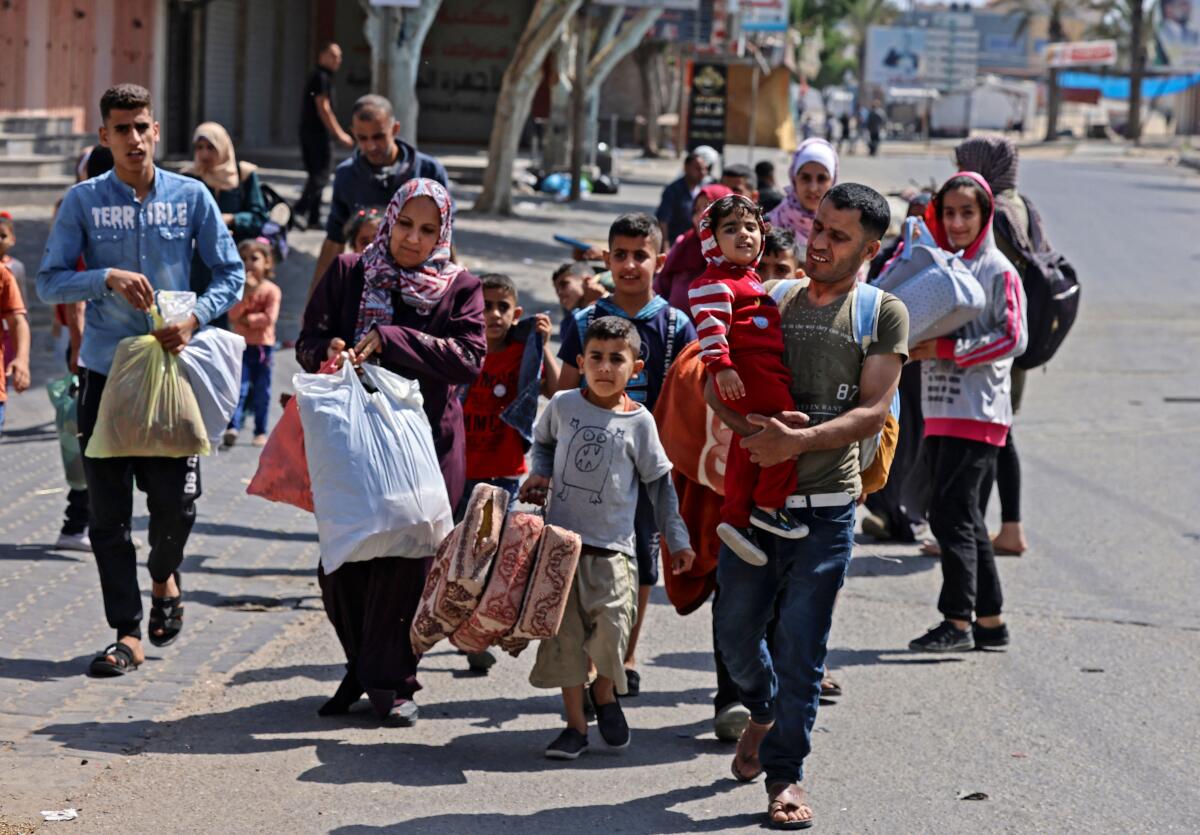
- Share via
GAZA CITY — Israel intensified its attacks on the northern part of the Gaza Strip early Friday, spurring hundreds of residents in the densely packed territory to flee their homes amid fears of a ground incursion.
The Israeli military announced a ground and air assault on northern Gaza, amassing troops along the Israel-Gaza border and pounding the area with artillery and airstrikes. But it had refrained from entering the enclave, from which Palestinian militants have fired hundreds of rockets into Israel.
“There were dozens of artillery shells falling on our house,” said Khouloud Nasser, 40, of the northern Gazan town of Beit Lahiya, who escaped from her home along with dozens of family members at dawn Friday. “We would have died under the rubble if we stayed there.”
The stepped-up campaign came several days into an eruption of violence that has seen Israel square off against the Islamic militant group Hamas — which controls the Gaza Strip — as well as contend with rising civil unrest domestically between its Jewish and Arab citizens.
Israel continues its assault on the Gaza Strip as the U.S. and others call for a cease-fire.
Hundreds of Israeli strikes on Gaza this week have left at least 119 people dead, 31 of them children, and 830 wounded, according to figures from Gaza health authorities. Israel has suffered seven fatalities, including a soldier and a child, from rockets launched by Hamas and Islamic Jihad militants. Dozens of civilians have been injured.
The Israeli military says 1,800 rockets have been fired at Israel, about a quarter of which fell short in Gaza or malfunctioned.
Israel’s pummeling of northern Gaza from both the air and the ground Friday pushed hundreds of residents to escape, many of them carrying what few belongings they could shove into shopping bags and laundry baskets.
“We’re civilians,” said Nasser, who with her family headed to Gaza City, hoping to find shelter in one of the schools run by the United Nations. “There’s nowhere for us to go.”
Ibrahim Badran, 45, was running down the street, clutching a plastic bag he had stuffed with clothes for his children.
“The Israelis shelled the area indiscriminately. Many people are under the rubble now,” he said. “Ambulances can’t get there because of the firing, so it was too risky to stay.”
As rockets from Gaza streaked overhead, Arabs and Jews fought each other on the streets below.
Lt. Col. Jonathan Conricus, an Israeli military spokesman, said Israeli forces took care with their targets but were not always able to give warning to residents.
“As always, the aim is to strike military targets and to minimize collateral damage and civilian casualties,” Conricus said, according to the Associated Press. “Unlike our very elaborate efforts to clear civilian areas before we strike high-rise or large buildings inside Gaza, that wasn’t feasible this time.”
Israel’s military said the operation involved 160 aircraft, artillery and infantry units along the border. The assault hit 150 targets, destroying miles of Hamas’ tunnel network, through which the organization smuggles weapons and other goods. The Israeli military refers to the network as “the Metro.”
“In the last day we have attacked underground targets. Hamas thought it could hide there, but it cannot,” Israeli Prime Minister Benjamin Netanyahu said in a video address Friday, adding that Hamas was “paying and will continue to pay a heavy price.”
“It’s not over yet. We will do everything to restore security to our cities and our citizens.”
Yet there was little sign that Hamas would suspend its attacks.
U.S. backs Israel’s right to self-defense but says military has an ‘extra burden’ to avoid killing civilians as scores of Palestinians die in Gaza.
“We have much more to give,” Abu Obaida, a spokesman for the Abu Qassem Brigades, Hamas’ military wing, said in a televised statement Thursday. He added there would be “no red lines” or sacrosanct rules of engagement in responding to Israel’s strikes.
Any ground incursion would be an opportunity to increase the group’s “haul of enemy prisoners and dead,” Abu Obaida warned.
In the U.S., President Biden has expressed his “unwavering support for Israel’s security and for Israel’s legitimate right to defend itself and its people,” the White House said. Biden told reporters that he did not see Israel’s response to the rocket attacks as “a significant overreaction” but that he hoped “we will see this coming to a conclusion sooner than later.”
The escalating conflict follows weeks of tension in East Jerusalem’s Sheik Jarrah neighborhood, where some Palestinian families face eviction from their homes to make way for Jewish residents. Israeli authorities characterize the issue as a private real-estate dispute, but it has become a symbol for what Arab residents say is systematic discrimination against them despite their being citizens of Israel. The Sheik Jarrah families have been confronted by Jewish settlers and right-wing extremists calling for “death to Arabs.”
Tensions in Jerusalem grew after Israeli police fired rubber bullets and stun grenades at rock-throwing Palestinians who had gathered at Al Aqsa Mosque, Islam’s third-holiest site, for the final days of Ramadan.
The confrontations prompted Hamas to launch rockets that reached deep into Israel, including cities such as Tel Aviv. Israel responded with airstrikes, destroying buildings in Gaza’s crowded neighborhoods. Pitched battles inside Israel between Jewish mobs and Arab vigilantes have deepened the conflict.
The current violence reflects a stalled ‘peace process.’
Netanyahu has called for a stop to the communal violence, although he himself has been accused of fanning anti-Arab sentiment.
“It doesn’t matter to me that your blood is boiling. You can’t take the law in your hands,” he said.
Across the Israeli-occupied West Bank, Palestinians demonstrated and threw stones at Israeli forces. Seven Palestinians were killed by Israeli army fire, Palestinian health officials said, according to the Associated Press.
The unrest has also touched a nerve beyond Israel’s borders, galvanizing Palestinian diaspora communities abroad to organize solidarity marches. On Friday, thousands gathered in downtown Amman, Jordan’s capital, to protest Israel’s actions in Jerusalem and the Gaza Strip. Hundreds later stormed a border checkpoint between the two countries, where they were stopped by Jordanian police.
The Israeli military said it fired tank rounds in the northern part of the country as a warning to a group of men that had breached the border fence.
Lebanon’s state-run National News Agency reported that two men were wounded in the shelling; one died after being taken to a hospital.
When Israel’s air and artillery assault began early Friday, Monera Nasir, 55, found dozens of family members running to her house in Beit Hanoun for shelter. But two hours later, the shelling increased, forcing them to escape again to the U.N. school in the Jabaliya refugee camp.
“We left in the middle of clouds of fire and explosions. Some of my family are in the hospital, others here with us at the school,” she said. “No one here is a militant. These are children and pregnant women. Why shell us?”
Special correspondent Salah reported from Gaza City and staff writer Bulos from Kabul, Afghanistan.
More to Read
Sign up for Essential California
The most important California stories and recommendations in your inbox every morning.
You may occasionally receive promotional content from the Los Angeles Times.
